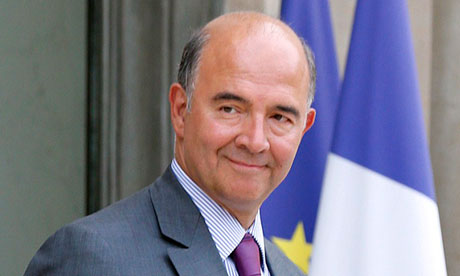Emerging from a 45-meeting with Prime Minister Antonis Samaras on Monday, visiting European Commissioner for Economic and Financial Affairs Pierre Moscovici stressed that Greece΄s economy “has obviously made great progress in recent years and months” and that no one in the Commission disputed this progress. The meeting was also attended by Finance Minister Gikas Hardouvelis.
According to AMNA, at the same time, he underlined that Greece and all the countries in the Eurozone needed to carry out structural reforms, while Greece needs to complete the reforms included in its current programme.
“There must be more reforms from the specific programme, which is extended for two months, for a new kind of relationship between the European Union and Greece, via the precautionary credit line,” he stressed.
Moscovici acknowledged that Greece and the Greek people had made a huge effort, perhaps the greatest ever made, but noted that the reforms had been necessary to make the Greek economy more robust, as indicated by the figures for growth and unemployment, while more of the reforms included in Greece΄s programme needed to be carried out.
He expressed hope that in the remaining two months, Greece will complete the programme and its review so that “we can go to a new relationship and give another future to the relationship between Greece and the Commission.”
Moscovici declined to comment on the possible effect on Greece΄s economy if the country failed to elect a new president and was led to early general elections, saying he would not intervene in Greek politics. He stressed that he was in Athens to talk with the legally elected Greek government and Prime Minister Antonis Samaras. He also noted that he had repeatedly spoken with Hardouvelis in recent days, both to praise the progress made and to stress the need for reforms, and, thirdly, “to go to a new relationship with Greece, with cooperation”.
“The citizens must know these things. To know, in other words, about the precautionary credit line and – why not – a credit line with the International Monetary Fund (IMF). We are working so that we have something clean after this programme. I am here as a friend but also firm in my principles,” he added.
Asked about the possibility that Greece might exit the euro, Moscovici replied that this “would be a shame, since there has been so much work done by the government and Greek authorities, so much effort and so many painful things and especially now when we are wrapping up the review, the programme, and heading toward another kind of relationship, with greater harmony.”
Hardouvelis, on his part, stressed that the meeting had not touched on politics at all and focused almost exclusively on the new relationship between Greece and the Eurozone from the new year.
Regarding the reforms, the finance minister said that the majority had been carried out and that, for them to continue, people had to want them, while adding that they would want them, once they understood that these would improve their position.
He stressed that 2015 would be an important year, since incomes were rising and unemployment would fall. “The Eurozone has supported us but is firm in the position that we must also fulfil our promises. Then they will help as well. Our job is how to fix the institutions. We owe it to our children,” Hardouvelis stressed.





